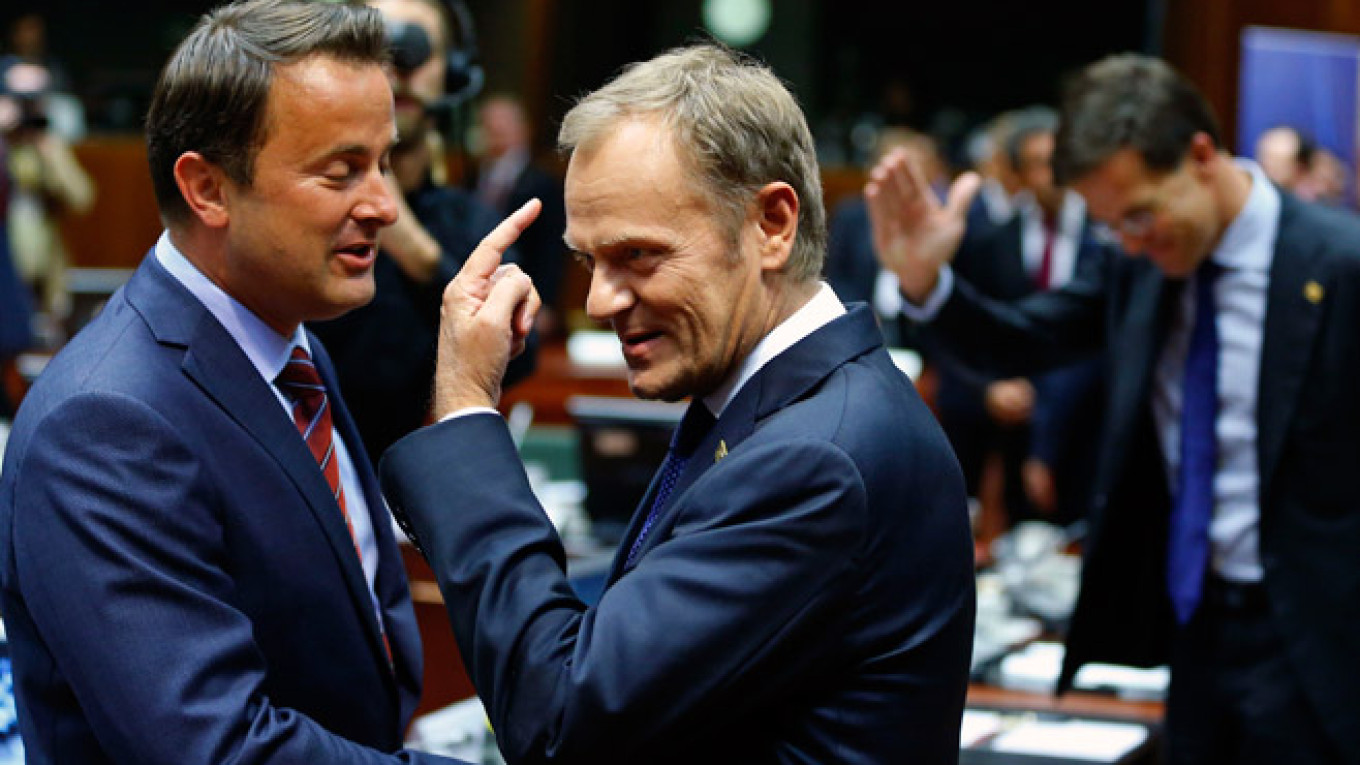European Union leaders have agreed at a summit in Brussels to have new sanctions against Russia prepared within the next week if Moscow does not take steps to de-escalate the Ukraine crisis, though some of the bloc's members have denounced the tactic.
Ukrainian President Petro Poroshenko, who briefed Saturday's summit on the situation in the country's east, said Ukraine was a victim of "military aggression and terror" involving "thousands of foreign troops and hundreds of foreign tanks," the BBC reported.
"In the past three days the situation has dramatically escalated as President Poroshenko informed us in detail," outgoing European Council President Herman Van Rompuy said at a press conference following the meeting late Saturday.
"The European Council is extremely concerned by the intense fighting, the flows of fighters and weapons coming from Russia into eastern Ukraine, and the presence and actions of Russian armed forces on Ukrainian soil," Van Rompuy said.
Pro-Russian separatists last week launched a counteroffensive in eastern Ukraine, encircling government forces in several pockets south of Donetsk, a site of previous fierce fighting.
Also last week, 10 Russian paratroopers were captured by Ukrainian forces near the country's eastern border who said they wandered into Ukraine's territory by mistake.
Russian authorities have repeatedly denied any direct involvement in the conflict in eastern Ukraine, but have said Russian volunteers were fighting alongside local rebels.
"There was, around the table, unity that if Russia continues to escalate the crisis it will come with a high cost," European Commission President Jose Manuel Barroso said in a statement.
He said the EU council will be quick to deliver proposals for more restrictive measures against Russia.
"What is happening in Ukraine is so serious that the European Council will be obliged to react by increasing the level of sanctions if things remain as they are — that is to say, with the proven presence of weapons coming from Russia, perhaps more soldiers who are also over the borders," French President Francois Hollande was quoted by Reuters as saying upon his arrival at the summit.
But not all EU leaders supported the idea to pressure Russia with sanctions over its involvement in the Ukrainian crisis.
Following the meeting in Brussels, Slovak Prime Minister Robert Fico said new sanctions would be "meaningless and counterproductive" and reserved the right "to veto sanctions harming national interests of Slovakia."
In late July the European Union slapped Russia with its harshest sanctions to date, including a limit on access to EU capital markets for Russian state-owned banks, an embargo on arms trading and on EU exports of dual-use goods for military purposes. Additional measures were brought in with a view to block Russian access to sensitive technologies, particularly for the oil sector.
Those measures are already having a visible effect on Russia's economy, Van Rompuy said Saturday, adding that the European Council is "ready to take further significant steps in light of the evolution of the situation on the ground."
At the summit on Saturday, Polish Prime Minister Donald Tusk, known for being a tough critic of the Kremlin, was chosen to succeed Van Rompuy as the next EU council president and Italian Foreign Minister Federica Mogherini to head its diplomatic service.
Tusk will take office on Dec. 1, while Mogherini, if confirmed by the European Parliament, will take up her new position on Nov. 1.
Contact the author at [email protected]
A Message from The Moscow Times:
Dear readers,
We are facing unprecedented challenges. Russia's Prosecutor General's Office has designated The Moscow Times as an "undesirable" organization, criminalizing our work and putting our staff at risk of prosecution. This follows our earlier unjust labeling as a "foreign agent."
These actions are direct attempts to silence independent journalism in Russia. The authorities claim our work "discredits the decisions of the Russian leadership." We see things differently: we strive to provide accurate, unbiased reporting on Russia.
We, the journalists of The Moscow Times, refuse to be silenced. But to continue our work, we need your help.
Your support, no matter how small, makes a world of difference. If you can, please support us monthly starting from just $2. It's quick to set up, and every contribution makes a significant impact.
By supporting The Moscow Times, you're defending open, independent journalism in the face of repression. Thank you for standing with us.
Remind me later.


